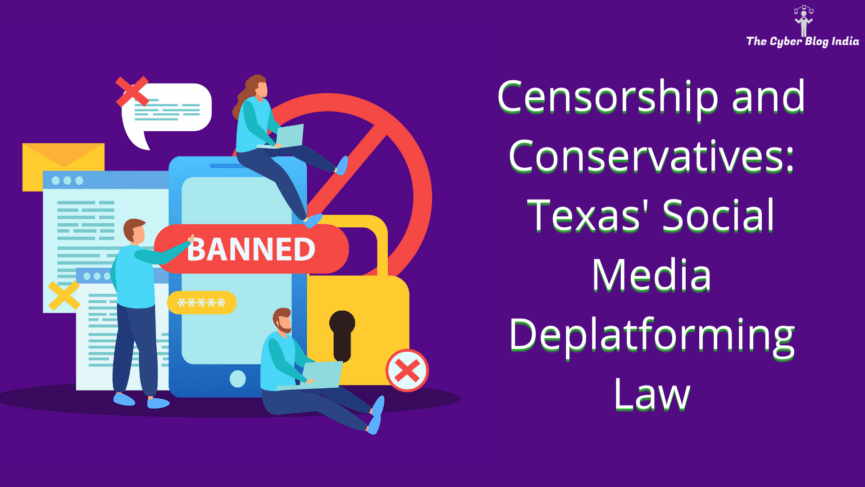Censorship and Conservatives: Texas’ Social Media Deplatforming Law


Censorship and Conservatives: Texas’ Social Media Deplatforming Law
Our modern-day public squares are social media platforms. They serve as forums for healthy public discourse where users exchange knowledge freely. However, there is a worrying trend among social media platforms to stifle conservative ideas and perspectives. To counter this, Texas has passed a deplatforming law prohibiting social media platforms from excluding users based on their political beliefs. The state Governor has further signed this law that will govern how social media platforms censor content. Lately, conservative politicians have accused social media platforms of censoring conservative ideas. After the Trump supports stormed the Capitol in January 2021, Facebook and Twitter responded by suspending former President’s accounts. Social media platforms have continued to deny suffocating conservative viewpoints. However, they do enforce the terms of service for prohibiting incitement to violence and coordinated misinformation.
What is deplatforming?
Deplatforming, or no-platforming, is an attempt to boycott a group or individual by removing the avenues they use for sharing information or ideas. One can also define deplatforming as an action or practice of banning an individual with undesirable or objectionable thoughts from participating in forums or discussions on a specific website.
Texas passed the new law known as HB20 in early September this year. This law forbids blocking (or demonetising or restricting) content based on a user or another user’s viewpoint. HB20 also requires transparency requirements on social media platforms to reveal how they promote and censor content. It further mandates that platforms must assess illegal content within 48 hours once they are warned. This is similar to at least one proposal in the US Congress. However, unlike Congress, a state legislature in the US cannot override Section 230 of the Communications Decency Act 0f 1996. The Attorney General may initiate a civil lawsuit against platforms that fail to comply with the requirements of this law.
Which platforms does this law cover?
This law applies to web services that allow users to “communicate with other users for the principal purpose of uploading information, comments, messages, or images”. A web service must have at least 50 million active users for this law to be applicable. It excludes internet service providers, news, and entertainment sites.
HB20 and email services
HB20 makes it unlawful for email service providers to impede the delivery of emails based on the message contents. However, email service providers can impede the delivery if they believe that a message contains malicious code, obscenity, illegal content, or violates the existing Texas anti-spam law.
The Texas anti-spam law prohibits sending emails with fraudulent, deceptive, or misleading information in the subject line. It further bans misrepresentations in the email address. It defines unsolicited commercial electronic messages as emails delivered without authorisation to someone with no established business relationship. This definition excludes emails sent by an organisation to interact with members, employees, and contractors. A business relationship means a former or current connection between two individuals through voluntary, two-way communication.
Possible legal challenges against deplatforming
One may claim that this law infringes on the private companies’ constitutional right to allow and decide content on their platforms. Another argument can be the violation of the First Amendment as it requires websites to post obscene, racist, discriminating, anti-semitic, and other types of harmful content.
While user content moderation is critical for keeping the internet safe, this law essentially brings content standards under government control. Although the Left Wing may challenge the law, it will come into effect in December 2021. Earlier this year in May, Florida passed a law preventing social media platforms from removing politicians from their platforms. Later, a federal court blocked certain sections after ruling that this law infringed the First Amendment right to free expression.
It is also possible that HB20 is a Republican attempt to intimidate social media platforms into removing objectionable but legal content. It can also be a campaign that conservative legislators have portrayed as an anti-censorship crusade against companies similar to phone companies or other communication utilities. The Florida law has a similar model for governing social media platforms, but it has certain unique aspects such as protections for politicians and an exemption for theme park owners.
Endnotes
The law’s future, as of now, remains uncertain. It is likely to face legal challenges as it is not structured to evade court scrutiny. The Texas law may have a similar fate as that of the Florida law. NetChoice, one of the plaintiffs that challenged the Florida law, condemned HB20; however, they have not committed to bringing in a similar lawsuit in Texas.
Featured Image Credits: Internet vector created by macrovector – www.freepik.com
